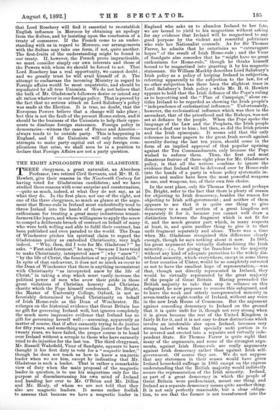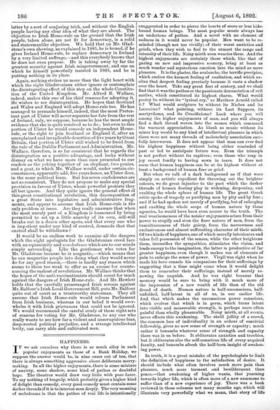THE EIGHT APOLOGISTS FOR MR. GLADSTONE. T HREE clergymen, a great
naturalist, an Aberdeen Professor, two retired Civil Servants, and Mr. H. G. Hewlett, give their reasons in the Nineteenth Century for having voted for Gladstonian candidates ; and we have studied these reasons with some surprise and consternation, —quite as much, indeed, at what they do not say, as at what they do. In the first place, not one of the eight, not one of the three clergymen, so much as glance at the argu- ment that Home-rule in Ireland must undoubtedly tend to throw Ireland into the hands of those gentlemen whose enthusiasm for treating a great many industrious tenant- farmers like lepers, and whose willingness to apply the screw to compel a deliberate breach of contract on behalf of many who were both willing and able to fulfil their contract, has been published and even paraded to the world. The Dean of Winchester pitches his spiritual claim to regard the Gladstonian policy as embodied Christianity, very high indeed. "Why, then, did I vote for Mr. Gladstone ? " he asks. "First and foremost," he says, "because I have tried to make Christianity, interpreted anew" [why " anew "?] "by the life of Christ, the foundation of my political faith." In spite of that endeavour, it does not so much as occur to the Dean of Winchester that there is anything inconsistent with Christianity "as interpreted anew by the life of Christ," in taking a step which must vastly increase the political power of men who avow their pride in those great violations of Christian honesty and Christian charity which the Pope himself condemned. Dr. Bright, the Master of University College, Oxford, is not so feverishly determined to plead Christianity on behalf of Irish Home-rule as the Dean of Winchester. He enlarges on the historical evidence that Great Britain has no gift for governing Ireland well, but ignores completely the much more impressive evidence that Ireland has no gift for governing herself well ;—assuming, apparently as matter of course, that if after earnestly trying to do justice for fifty years, and something more than justice for the last twenty years, we have failed, the proper course is to hand over Ireland without a scruple to those who have earnestly tried to do injustice for the last ten. The third clergyman, Mr. Russell Wakefield, Vicar of Sandgate, appears to have thought it his first duty to vote for a "magnetic leader," though he does not teach us how to know a magnetic leader when we see him, except by indicating that Mr. Gladstone is such a leader. That is rather a remarkable view of duty when the main proposal of the magnetic leader in question, is to use his magnetism only for the purpose of disembarrassing his own mind of Ireland and handing her over to Mr. O'Brien and Mr. Dillon and Mr. Healy, of whom we are not told that they also are magnetic leaders. It seems rather foolish to assume that because we have a magnetic leader in England who asks us to abandon Ireland to her fate, we are bound to yield to his magnetism without asking for any evidence that Ireland will be magnetised to any good purpose by the violent and resentful politicians who rule her Nationalist counsels. As for Sir Thomas Farrer, he admits that he entertains no "extravagant hopes" of the result of Irish Home-rule ; and the Vicar of Sand gate also concedes that he "might have no great enthusiasm for Home-rule," though he thinks himself bound to be magnetised into granting it by his magnetic statesman. Sir William Markby describes Lord Salisbury's Irish policy as a policy of keeping Ireland in subjection, referring apparently to the subjection to the law, for of no other subjection has there been the slightest trace in. Lord Salisbury's Irish policy ; while Mr. H. G. Hewlett appears to hold that the Irish defiance of the Pope's ruling as to boycotting and the "Plan of Campaign," alone en- titles Ireland to be regarded as showing the Irish people's "independence of ecclesiastical influence." Unfortunately, however, the ecclesiastical influence which was then in the ascendant, that of the priesthood and the Bishops, was not set at defiance by the people. When the Pope spoke the language of the Law and the Prophets, the Irish people turned a deaf ear to him ; but then, so did the Irish priests and the Irish episcopate. It seems odd that the only reference in these papers to the great Irish revolt against morality during the last ten years, should come in the form of an implied approval of that popular uprising against the Ten Commandments, only because the Pope wished to enforce them. Thus, the first and most disastrous feature of these eight pleas for Mr. Gladstone's policy, is that all the writers combine to ignore the evidence that Ireland will be delivered over by Home-rule into the hands of a party in whose policy systematic in- justice and malice have been the most powerful weapons in use, and weapons, too, of their own free choice.
In the next place, only Sir Thomas Farrer, and perhaps Dr. Bright, refer to the fact that there is plenty of reason for objecting to Irish democracy, besides the reason for objecting to Irish self-government ; and neither of them appears to see that it is quite one thing to give democracy to a, small section of a great kingdom not separately fit for it, because you cannot well draw a distinction between the fragment which is not fit for it, and the much greater part which, in many respects at least, is, and quite another thing to give it to that unfit fragment separately and alone. There was a time when Mr. Gladstone recognised this difference clearly enough, though he says nothing about it now. In 1885, his great argument for virtually disfranchising the Irish minority,—i.e., for giving the franchise to the majority without any kind of adequate protection to the widely dis- tributed minority, which everywhere, except in some three or four counties of -Ulster, would be so completely outvoted as not to have the smallest hope of representation,—was that, though not directly represented in Ireland, they • would be virtually represented by the great majority of the people of Great Britain. Having persuaded the British majority to take that step in reliance on this safeguard, he now proposes to remove this safeguard, and to leave the weak and utterly unrepresented minority in seven-tenths or eight-tenths of Ireland, without any voice in the new Irish House of Commons. But the argument against conceding democracy to Ireland on the ground that it is quite unfit for it, though not very strong when it is given because the rest of the United Kingdom is fairly fit for it, and it is not easy to draw distinctions which involve an intolerable slur upon Ireland, becomes very strong indeed when that specially unfit portion is to be severed and erected into a separate and virtually inde- pendent State. Sir Thomas Farrer is quite right that many of the arguments, and some of the strongest argu- ments, against Irish Home-rule are really arguments against Irish democracy rather than against Irish self- government. Of course they are. We do not suppose that any statesmen in their senses would have given Ireland household suffrage in 1885 except on the express understanding that the British majority would indirectly secure the representation of the Irish minority. Ireland, as part of a great democracy in which the people of Great Britain were predominant, meant one thing, and Ireland as a separate democracy means quite another thing. It is not only perfectly reasonable, but a clear obliga- tion, to see that the former is not transformed into the latter by a sort of conjuring trick, and without the English people having any clear idea of what they are about. The objection to Irish Home-rule on the ground that the Irish people, taken alone, are not fit for democracy, is a solid and statesmanlike objection. We hold that on Mr. Glad- stone's own showing, as explained in 1885, he is bound, if he gives Ireland Home-rule, to replace democracy in Ireland by a very limited suffrage,—and this everybody knows that he does not even propose. He is taking away by far the greatest security against Irish misgovernment, and one on which he himself powerfully insisted in 1885, and he is putting nothing in its place.
Again, nothing strikes us more than the light heart with which the eight Gladstonians either ignore or contemplate the disintegrating effect of this step on the whole Constitu- tion of the United Kingdom. Mr. Alfred R. Wallace, indeed, makes this one of his chief reasons for adopting it. He wishes to see disintegration. He hopes that Scotland and Wales and England will adopt Home-rule too. He has managed to persuade himself, indeed, that the most Protes- tant part of Ulster will never separate her fate from the rest of Ireland, only, we suppose, because he has the most ample evidence that she is quite resolved so to do ; but even to this portion of Ulster he would concede an independent Home- rule, or the right to join Scotland or England if, after an unexplained and inexplicable desertion of five years by Great Britain, that portion of Ulster still wished to be freed from the rule of the Dublin Parliament and Administration. Mr. Wallace, therefore, is so far consistent that he regards the disintegration as a positive advantage, and looks without dismay on what we have more than once presented to our readers as the yoking together of an elephant, two ponies, and a goat, to which Mr. Wallace would, under certain cir- cumstances, apparently add, five years hence, an Ulster deer, in the same political team. But his seven confederates are not so consistent. They do not propose to make any special provision in favour of Ulster, whose powerful protests they all but ignore. And they quite ignore the general effect of this great constitutional revolution, this decomposition of a great State into legislative and administrative frag- ments, and appear to assume that Irish Home-rule is the only problem at issue. Are they really unaware that when the most unruly part of a Kingdom is humoured by being permitted to set up a little anarchy of its own, self-will breaks out in a dozen other spots, and that every one who Is impatient under any kind of control, demands that that control shall be withdrawn ?
It would be an endless work to examine all the dangers which the eight apologists for the Gladstonian creed face with an equanimity and nonchalance which are to our minds simply astounding. Like the gentleman who votes for Mr. Gladstone because he is magnetic,—which means that he can magnetise people into doing what they would never do for any good reason,—there is hardly any reason which seems to them too weak to offer as an excuse for counte- nancing the rashest of revolutions. Mr. Wallace thinks that the hopes of the anti-vaccinationists should count for much against the dangers of Irish Home-rule. And Mr. Hewlett holds that the carefully prearranged Irish scream against Mr.Balfour's Irish Local Government Bill, puts Mr. Balfour quite out of court as a trustworthy statesman. They all assume that Irish Home-rule would release Parliament from Irish business, whereas in our belief it would over- whelm it with Irish grievances that could not be ignored. We would recommend the careful study of these eight sets of reasons for voting for Mr. Gladstone, to any one who really wants to see how far a violent and unscrupulous bias, deep-rooted political prejudice, and. a strange intellectual levity, can carry able and cultivated men.



































 Previous page
Previous page